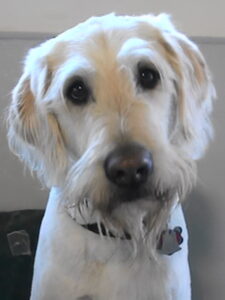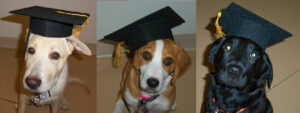Barks Blog
Distinguishing Ourselves as Force-Free Professionals
Some time ago I engaged in an online conversation with a dozen or more force-free trainers and the subject of professional certification came up. Most of the trainers had CPDT-KA credentials and some were considering letting them lapse because they saw little value in it. Others were new to the business and planned on testing for certification. One very experienced trainer rejected the need for certification and declared dog owners did not care about credentials.
In my experience only two or three owners ever asked basic questions to determine whether I was qualified in any way to train their dog. Undaunted, I make a point of telling owners what I know and what my sources of information are. As consumers of a service they deserve to know that I am not a hack.
I think the general assumption among dog owners is that all trainers are alike and without distinction. During my initial conversation with prospective new clients they often refer to me as “the expert” even though they have no information about my education, training or experience.

Pat Miller once wrote an article in The Whole Dog Journal about professional credentials to clarify the alphabet soup of initials canine professionals place after their names. If I remember correctly among approximately 50,000 dog trainers in the United States only about 3,500 had CPDT-KA certification at time of publication. Of course there are other certifications as well, but I suspect the percentage of credentialed trainers is quite low.
A recent study in Australia determined only 6% of trainers of working dogs have a formal certification and 52% have no training at all. I would not be surprized if most trainers in most countries lack certification or accreditation.
Germany is a standout, requiring all dog trainers to pass a standard examination. In that sense I think German canine professionals have distinguished themselves, and it is time for the rest of us to do likewise.
My choice to seek certification was due to an internal desire to test my knowledge against a standard comprehensive examination, to see whether I actually knew what I thought I knew. As a self-educated trainer it was all the more important to erase nagging self-doubt.
Recently the Pet Professional Accreditation Board (PPAB) established an even more comprehensive and challenging examination process for trainers and behavior consultants, with the additional distinction of accrediting force-free canine professionals. I am unaware of any other organization that distinguishes force-free trainers from those who use traditional methods.
When I sat for the (pilot) PCT-A exam I found it to be quite challenging, especially since I did not study or prepare in any way. I wanted to know whether the knowledge I carried with me on a daily basis was sufficient for the professional services I was offering. After the three-hour exam I felt humbled and all the more determined to improve my knowledge in subjects that I found most difficult.
I was delighted to learn that I passed with a grade that I found acceptable and could see more clearly what I needed to study for continuing education. PPAB raised the bar and is leading the way by setting industry standards for the future. I accepted the challenge and aspire to be better tomorrow than I am today.
Now is the time for all trainers to step forward and distinguish themselves.
If dog owners do not understand the value of our credentials, then it is our responsibility to educate them. I do so with each new client because I want them to have confidence in the advice I give them, and hope they will be more compliant as a result. My goal is achieving the best possible outcome.

There are 168 hours in a week and if the only training their dog gets is during the one hour I spend with it, I will fail to serve the best interests of the dog or owner. If owners are uninformed about the accreditation process and how our education and experience will help them, then it is our responsibility to explain it. When dog owners are better informed they can make better choices.
In an unregulated industry such as ours I think it is unacceptable to be passive and surrender to complacency. Doing so will enable dog owners to remain confused in thinking that all trainers are competent and use the same methods and equipment. That path leads far too many dog owners to uneducated and unskilled trainers, who often do harm that professionals must then remedy.
I praise PPG for taking the lead by establishing PPAB and helping us distinguish ourselves as force-free professionals. We offer something of great value. The time has come to challenge ourselves through PPAB accreditation and set higher standards for our industry. Will you join us?
To learn more about dog training the force-free way, register for the Pet Professional Guild’s inaugural educational Summit in Tampa, Florida on November 11-13, 2015.
Daniel H. Antolec, CPT-A, CPDT-KA is the owner of Happy Buddha Dog Training. He has membership in Pet Professional Guild, Force-Free Trainers of Wisconsin, Association of Professional Dog Trainers, Association of Professional Humane Educators and American Society for the Prevention of Cruelty to Animals. He also sits on the Board of Directors for Dogs on Call, Inc. and is Chairman of Pet Professional Guild Advocacy Committee.

